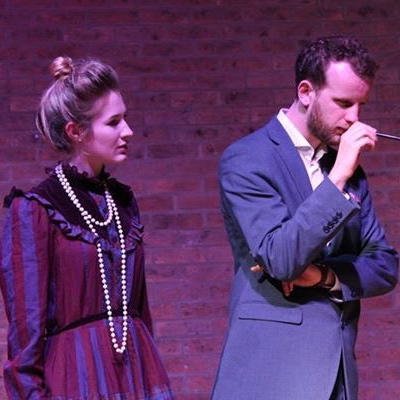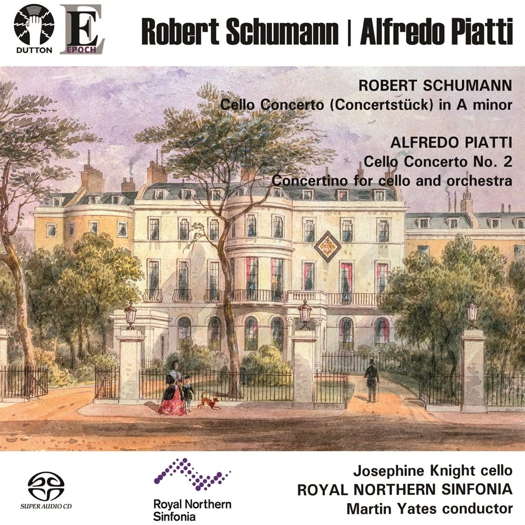 SPONSORED: Ensemble. A Great Start - Freddie Meyers' new opera A Sketch of Slow Time impresses Alice McVeigh.
SPONSORED: Ensemble. A Great Start - Freddie Meyers' new opera A Sketch of Slow Time impresses Alice McVeigh.
All sponsored features >>

Lightness and Joyousness
GEOFF PEARCE strongly recommends Josephine Knight's recordings of works for cello and orchestra by Robert Schumann and Alfredo Piatti
'This is a beautifully presented disc, the orchestra and soloist work very well together, are in very fine fettle and the recordings could easily be put up there with the very best.'
The Schumann cello concerto is one work that I have loved since I first heard it performed in New Zealand by Jacqueline du Pré when I was a child. The Piatti works were not familiar to me, even though I knew that the composer was a nineteenth century virtuoso cellist.
This very fine cellist, Josephine Knight, is playing her own new edition of the Schumann work as she was dissatisfied with the liberties taken by previous editions and manuscripts of this work. She also wanted to be true to Schumann's intention that this work is a Concertstück for cello and accompanying orchestra - not a concerto as it is most often called.
There is a lightness and joyousness in this work that is often not realised. I think, as the composer wrote it in 1850 just after he had started his final posting at Dusseldorf, many people have read into it that he was in a state of mental turmoil, where in actual fact it was a few years into the appointment that his illness manifested itself.
The first movement is lyrical, at times brooding, but the joyousness is never far from the surface. Certainly this is a work that requires considerable mastery of the instrument, but the soloist does not make it seem as epic as many other soloists have done, and concentrates on the light and lyrical nature of this movement. The accompanying orchestra is never in danger of battling over the soloist, and the dialogue that happens between the cello and the various orchestral groups is a delight.
Listen — Schumann: Nicht zu schnell (Concertstück in A minor)
(track 1, 4:14-5:06) © 2020 Dutton Epoch :
The second movement, with its fine rather sad long melody introduced in the cello, is not taken too slowly, but has its own lyrical sweetness, and some very fine playing in the orchestra writing. The soloist, again, is not too dramatic or heavy, and it seems to me if this movement is a song in the style of a romance. Josephine Knight's tone is very attractive, reminding me of a very fine singer.
Listen — Schumann: Langsam (Concertstück in A minor)
(track 2, 0:58-1:47) © 2020 Dutton Epoch :
The third movement is a lively dance, in my opinion, and again beautifully articulated and a real delight to the ear. This is certainly the most virtuosic and rousing of the three movements. As the detailed accompanying booklet says, it is in the final part of this movement where one of the most extensive changes occurs in the edition. I have to say that I really love this account of this work and it is definitely one that I will often return to.
Listen — Schumann: Etwas lebhafter (Concertstück in A minor)
(track 3, 6:35-7:35) © 2020 Dutton Epoch :
Alfredo Piatti (1822-1901), a virtuoso cellist and composer, spent quite a long time in England, and actually gave the first performance of the Schumann concerto there.
The first work of his on the disc is a very fine Concertino that was written in 1862. It is in three movements, is a fine and quite dramatic work, and the style reminds me somewhat of Piatti's teacher Molique. The term 'Concertino' is somewhat misleading as this is no short work, running to over twenty minutes. There are some fine melodies and plenty of writing to highlight the composer's fine cello playing skills. The first and second movements are joined by a bridging section, and the third movement is nearly as long as the first two movements. It is full of youthful enthusiasm and passion. The middle movement is a very fine heartfelt Romance and one cannot help wondering why his music is not more often performed today.
Listen — Piatti: Adagio - Più animato (Concertino in A minor, Op 18)
(track 5, 2:50-3:39) © 2020 Dutton Epoch :
The Second Cello Concerto, first performed in 1873, is also a very fine work. It feels more formal. The composer shows that he is a gifted melodist and a deft orchestrator, and the work is performed with as much love and dedication as is shown in the Schumann.
Listen — Piatti: Allegro vivo (Cello Concerto No 2, Op 26)
(track 9, 0:00-0:54) © 2020 Dutton Epoch :
This is a beautifully presented disc, the orchestra and soloist work very well together, are in very fine fettle and the recordings could easily be put up there with the very best. I think that putting the Piatti works with the Schumann was a great choice. Stylistically they work well together and both composers are great melodists. It is a pity that Piatti did not write a wider range of music other than just for cello, as he would be then much more widely known than he is today. I strongly recommend this disc, and know it will delight all who buy it.
Copyright © 2 October 2020
Geoff Pearce,
Sydney, Australia

CD INFORMATION - ROBERT SCHUMANN: CELLO CONCERTO (CONCERTSTÜCK)
FURTHER INFORMATION: ROBERT SCHUMANN
FURTHER INFORMATION: DUTTON EPOCH



